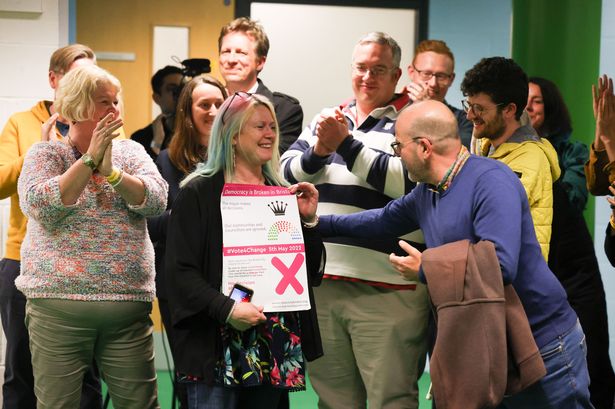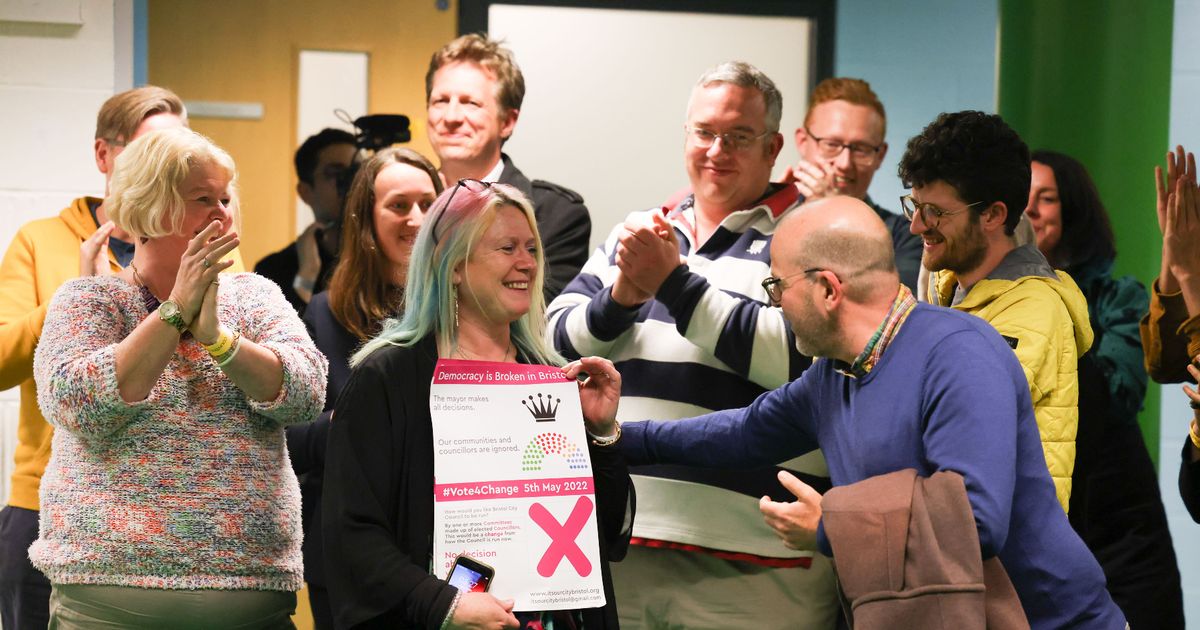It’s been just over a year since the committee model was introduced, but it won’t last for long Campaigners and councillors celebrating the 2022 vote to switch to a committee model, which will shortly be scrapped(Image: Paul Gillis/Bristol Live)
Campaigners and councillors celebrating the 2022 vote to switch to a committee model, which will shortly be scrapped(Image: Paul Gillis/Bristol Live)
Bristol City Council will be forced to scrap the committee model in an upcoming major government shake up.
Three years ago Bristol voted to introduce the committee model in a city-wide referendum and scrap the directly elected mayor, but now faces yet another change.
The government has revealed plans to force councils run by policy committees, such as Bristol, to adopt the leader and cabinet model.
This has sparked outrage among Greens and Liberal Democrats in Bristol, but was welcomed by Labour who said the eight policy committees are “shambolic”.
A government minister said the change would prevent councils from “wasting taxpayer funds on needless changes to systems of governance”.
However, the change means Bristol will be switching its system of governance again for the third time in the recent years.
How the city is currently run
The council is currently run by eight policy committees.
These are each made up of councillors from different parties and responsible for different topics, like education and transport.
The Greens chair six of the eight committees, with the Liberal Democrats chairing the other two.
This is the system that has been used in Bristol since May last year, following a referendum in 2022 which scrapped the mayoral system.
Under the mayoral system
Previously, the council was run by a directly elected mayor.
First came the independent George Ferguson, who was in charge from 2012 to 2016, and then Labour’s Marvin Rees, in charge from 2016 until 2024.
This system gave the mayor a lot of powers and sway, but was unpopular among some Bristolians as they considered that power was too concentrated, leading to the referendum.
What the cabinet model means for you
Bristol used to have a cabinet and leader model before 2012, before the city first adopted the directly elected mayor model.
The city voted to scrap that system in a referendum — but will now be forced by the government to revert back to that system anyway.
It’s unclear when the changes will take place, as the law must first be approved by parliament.
The model works in a similar way to the government, with a council leader and a cabinet of about eight councillors responsible for different policies, like transport and education.
The model is effectively halfway between having a mayor, with lots of power centralised in one politician, and a committee model, with powers spread out among many councillors.
Most councils in England use this system, with some people believing that the balance is just right between giving politicians enough powers to make proper and prompt decisions, while ensuring enough democratic oversight.
The mayoral model in Bristol was criticised for not having enough oversight.
The huge problems facing Bristol City Council — rising demand for expensive social care and special needs education and a lack of cash from the government — are unlikely to be solved by yet another confusing and time-consuming change in governance, according to the Greens.
However Labour believes these issues will have better focus from politicians who are more accountable.
For the average person in Bristol, this could mean decisions affecting how they get around the city, where they live, or the schools their children attend, are less transparent.
On the other hand, there could also be less dithering and bickering between politicians from different parties, leading to more decisive action. Either way, the switch will be yet another headache for those running the city.
Jim McMahon, minister for local government and devolution, said in a written statement: “At present there is a complex and opaque system which allows councils to operate one of three governance models: cabinet arrangements with a directly elected council mayor, leader and cabinet, or the committee system.
“As a result, councils are left with a complicated governance system. This can be confusing to the taxpayer, particularly in the case of the committee system, which can be unclear, duplicative, and wasteful, leading to slower, less efficient decision-making.
“This change will provide clearer, more easily understood structures at a local level, improving efficiency and preventing authorities from wasting taxpayer funds on needless changes to systems of governance.”
The minister added the new law will mean committee-run councils need to switch to a “leader and cabinet” model, used by most English councils already. This will make governance simpler, make it clearer who is responsible and accountable, and lead to more efficient decisions.
What the political parties in Bristol have to say
The revelation was not welcomed by the Greens or Liberal Democrats in Bristol, who have been in power since May last year.
Greens said the decision was “undemocratic and clueless”, and they backed the committee model for being more transparent and collaborative.
Green Councillor Heather Mack, deputy council leader, said: “This is totally at odds with the devolved powers that Labour advocate for and is an insult to Bristol. Keir Starmer clearly does not think that local people can make the best choices for themselves.
“Most importantly, this will not solve the big problems we face. Greens have been asking successive governments for years for proper funding to address the many crises in local government.
“Labour promised change but they have no answers when it comes to the real issues local authorities and residents face — crisis in the private rental sector, SEND provision, increasing demand for adult social care and meeting net zero commitments.
“All the while they are attempting to squash a rebellion of their own Labour MPs so they can plunge hundreds of thousands into poverty by slashing their benefits.
“This Labour government has no plan to improve the lives of working people in Bristol, who will be rightly outraged with them once again meddling with local democratic decisions while providing no respite from 15 years of austerity.
“We need proper investment in communities, funded by a tax on the ultra-rich, or this government will feel the consequences at the next election.”
Since taking power, the Greens added that they had improved children’s services, addressed safety concerns in council housing, and started ambitious housing and transport projects.
They believe a leader and cabinet model will be less democratic than the current system which sees a policy committee made up of councillors from all parties take responsibility for big decisions.
Liberal Democrat Cllr Stephen Williams, chair of the public heath and communities policy committee, added: “The committee system has improved the transparency of decision-making in the council, and has allowed all councillors and parties the opportunity to shape the council’s work and input into discussions and decisions early on. Unfortunately, not all parties have approached the committee system in good faith.
“Bristol Labour, instead of coming together with the other parties to do what is best for Bristolians, have chosen not to take up the positions of responsibility that were available to them. Rather, they have been set on playing political games, preferring to be an ‘opposition’ — despite being equally involved in decision-making.
“The Labour government’s overriding of local democracy is a shocking move. What we need is not another costly change to the decision-making process, but for Bristol Labour to step up and play their part in the council. If the government truly cared about improving local government, they would ensure that hard-working councils are funded properly and that a fair voting system was implemented, once and for all.”
However, Labour welcomed the changes and said the committee system in Bristol had been “nothing short of shambolic” and a “failed experiment”.
Labour used to run the city council for eight years, with former mayor Marvin Rees blamed by some campaigners for voters scrapping the mayoral model.
Since the switch, Labour declined to take up their roles as policy committee chairs, choosing instead to be in opposition to the Green-Liberal Democrat administration.
They have spent the past year or so scrutinising the administration’s decisions and providing often critical feedback. Cllr Tom Renhard, leader of the Labour group, said that local decision-making has not been transparent, stable nor effective.
He added: “Labour councillors wanted this to work and have acted as a constructive opposition — chairing groups to set up new bus routes, collaborating on a new economic strategy for the city, and submitting alternative budget plans, as a few examples, alongside our role scrutinising the administration. However, it has become apparent to everyone, regardless of their political stripes, that this system wasn’t serving Bristolians effectively.
“The government is right to step in — taxpayers should not be hampered with an archaic governance system that is not fit for purpose. We have seen council housing schemes scrapped in behind-closed-doors meetings, public assets sold off without a public vote or scrutiny, and councillors avoid accountability for their plans once it’s clear they are unpopular. Quite frankly, Bristolians deserve better.
“Local councils using one governance system will make the whole system of local government more efficient and easier for the public to understand and access. A leader and cabinet system, similar to parliament, will allow our city to have effective, timely, well-scrutinised decision-making — if the Greens get their act together.
“But it’s worth remembering: it wasn’t the committee system that put forward proposals to close 19 libraries, sack all the lollipop people, and cut black bin collection to once every four weeks — it was the Green Party. The committee system isn’t working effectively, but neither are the Green Party councillors running it.”
